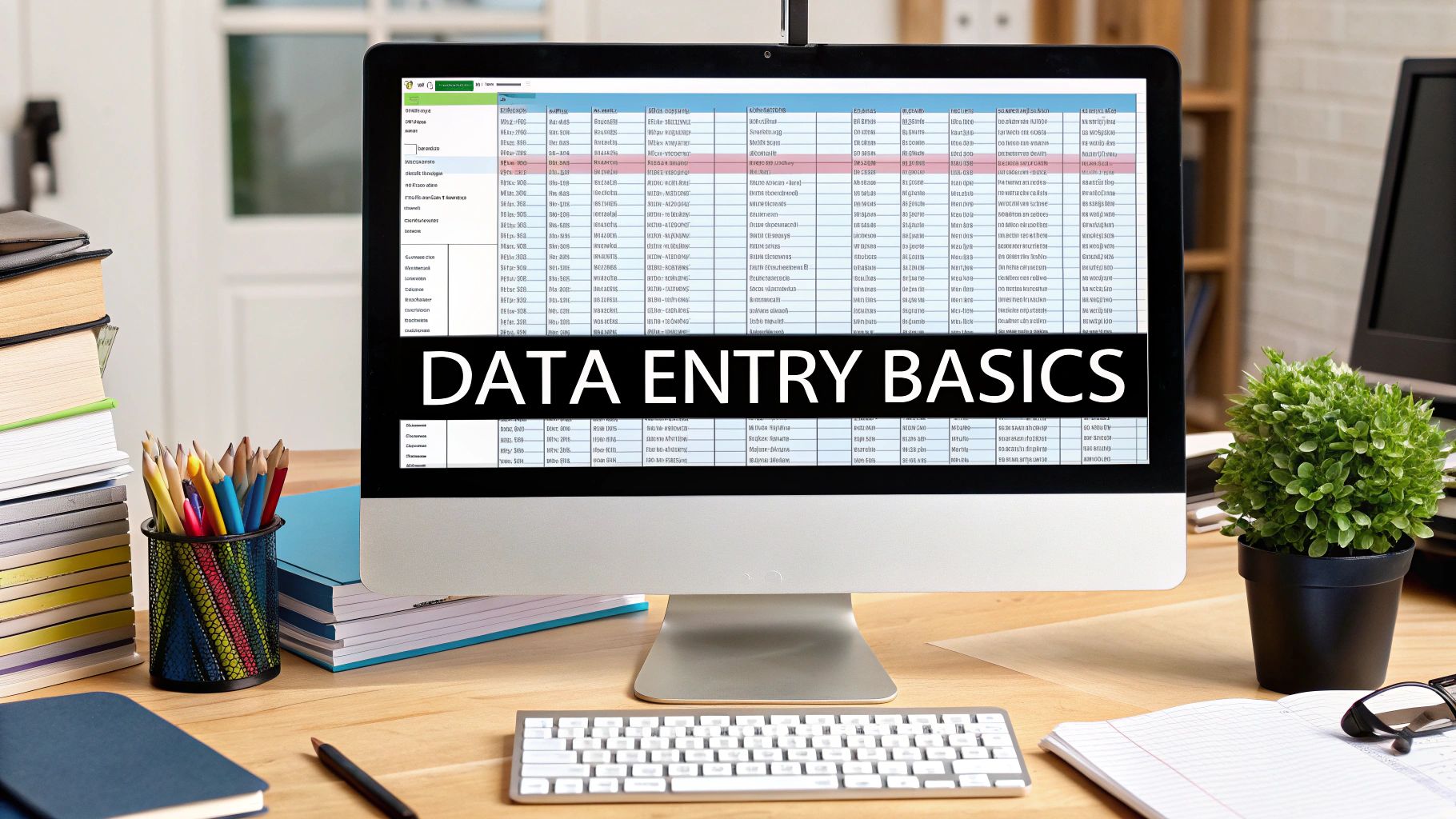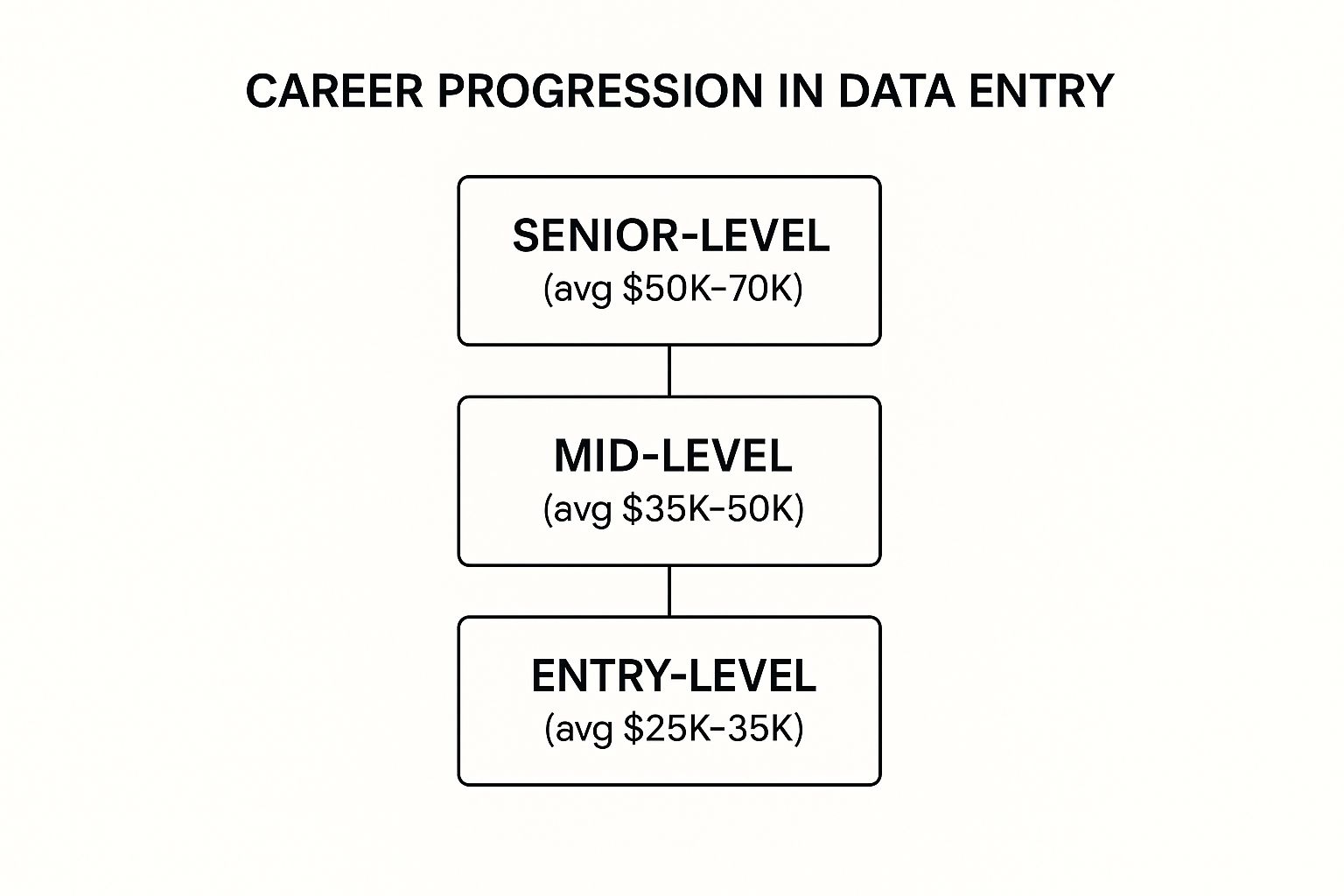So, what exactly is a data entry job? At its heart, it is about accurately getting information from one place into another, usually a digital system. Think of it as being the custodian of a company's most important information—making sure everything from customer details to financial records is organised, correct, and easy to find.
What a Data Entry Job Really Involves Today

This role goes far beyond just typing fast. The real focus is on maintaining data integrity. A data entry professional is the first line of defence against messy, inaccurate information, which can cause serious headaches for a business down the line.
Every single piece of data—whether it is from an invoice, a customer survey, or even handwritten notes—has to be entered with painstaking precision. This is critical because other departments, like sales or finance, rely on that data to pull reports and make decisions. The quality of a data entry specialist's work directly underpins the entire company's strategy.
Data Entry Role at a Glance
To give you a clearer picture, here’s a quick summary of what a typical data entry role looks like in Australia.
| Aspect | Description |
|---|---|
| Core Function | Transcribing data from various sources (paper, digital) into a computer system or database. |
| Key Responsibility | Ensuring the accuracy, consistency, and security of all entered information. |
| Common Tasks | Entering customer details, updating records, processing invoices, and verifying data for errors. |
| Essential Skills | Fast typing speed, high attention to detail, computer literacy, and familiarity with data programmes. |
| Work Environment | Typically office-based or remote, working independently with clear targets and deadlines. |
As you can see, it is a role built on precision and reliability, forming the foundation for how a business operates.
A Foundational Role for Any Business
This role is fundamental to how so many Australian businesses run. From a small local start-up to a massive corporation, every organisation needs accurate data management to function properly. It is non-negotiable.
For anyone looking at data entry, especially in smaller companies, a good grasp of small business document management is a huge advantage. At the end of the day, it is all about solid record-keeping.
A data entry specialist does more than just move information around; they build the foundation of a company's operational intelligence. The accuracy of their work enables reliable analytics, smooth customer interactions, and sound financial planning.
Your Day-to-Day Responsibilities and Tasks

So, what does a data entry professional actually do all day? While the job title sounds straightforward, the role is far more dynamic than just typing. At its heart, it is about being the crucial bridge between raw information and organised, usable digital records.
Your time will be spent accurately transcribing data from source documents—think handwritten forms, scanned invoices, or even audio files—into a company’s database or CRM system. The work is incredibly varied. One day you might be processing financial figures for an accounting report, and the next you could be entering feedback from customer surveys.
A single misplaced decimal or misspelt name can have serious consequences, affecting everything from financial reporting and stock levels to customer relationships. The responsibility to maintain accuracy is immense.
This brings us to verification. A huge part of the job involves reviewing data sets to spot and correct errors, identify missing information, and ensure everything is consistent. It is a task that demands sharp focus and a real eye for detail.
What Does This Look Like in Practice?
To get a real feel for the role's impact, let's look at some common scenarios. Data entry is not just about filling spreadsheets; it is about powering essential business functions.
- Processing Supplier Invoices: Imagine receiving a stack of invoices. Your job is to enter key details like invoice numbers, amounts, and due dates into the accounting software, making sure suppliers are paid on time.
- Updating Client Records: When a sales representative meets a new client, you are the one who creates their profile in the CRM, inputting their contact details, company info, and important notes from the meeting.
- Transcribing Medical Notes: In a healthcare setting, you might listen to a doctor's dictated notes and flawlessly transcribe them into a patient's electronic health record—a task where precision is absolutely critical.
These tasks are the backbone of a smoothly running business. To really excel, it helps to see the bigger picture and understand how your work supports wider strategies, like following essential data management best practices. This knowledge transforms the job from a simple task to a critical function.
The Essential Skills You Need to Succeed

To really shine in a data entry job, you need a specific blend of practical skills and the right personal qualities. These are exactly what employers are screening for, as they directly shape the quality and speed of your work.
Let's start with the technical abilities, often called hard skills. These are the non-negotiable, measurable capabilities you have got to bring to the table.
- Fast and Accurate Typing: Speed is good—it is often measured in words per minute (WPM)—but accuracy is everything. A blistering typing speed means nothing if the data is riddled with errors.
- Software Competence: You will need to be comfortable with programmes like Microsoft Excel and Word as a bare minimum. Many jobs also expect you to know your way around specific database software or customer relationship management (CRM) systems.
- Computer Literacy: This is about more than just turning a computer on. Solid file management skills, general computer savvy, and the ability to pick up new software quickly are foundational.
But being technically proficient is only half the picture.
Soft Skills That Make You Stand Out
The personal qualities you bring to the role—your soft skills—are just as critical. These traits are what determine how well you manage your responsibilities and work with others.
Exceptional attention to detail is the cornerstone of a successful data entry career. It is the skill that prevents small mistakes from escalating into significant business problems, ensuring the integrity of the data you manage.
Strong organisational skills are also vital for keeping huge volumes of information in check, while great time management helps you hit deadlines without compromising on quality. It is often these skills that open doors for career advancement.
As you build on these skills, your earning potential naturally grows. In Australia, an entry-level data entry officer might start on around AUD 59,000. With experience and proven capabilities, that figure can climb closer to AUD 68,000.
Mastering this mix of skills does not just make you a great data entry specialist; it builds a powerful foundation for what comes next. The meticulous data handling skills you develop, for example, are directly transferable to more analytical positions. If you are curious about where this path could lead, check out our guide on the differences between a data analyst vs a data scientist.
Understanding Salary Expectations in Australia
So, you are thinking about a data entry role and wondering what you can expect to earn. It is a smart question. In Australia, the pay packet for these jobs is not a one-size-fits-all figure; it really depends on your location, the industry you are in, and how complex the job is.
You will also find different pay structures out there. Temporary or freelance gigs often pay by the hour, which is great for flexibility. On the other hand, permanent roles usually come with a steady annual salary plus benefits like superannuation and paid holidays. Some jobs are even performance-based, where you get paid based on how much data you process – a "piece-rate" model.
Typical Salary Ranges and Influencing Factors
Let's get down to the numbers. In Australia, the average weekly salary for a full-time data entry professional is around AUD 1,035. This typically works out to an annual salary somewhere between AUD 50,000 and AUD 75,000, though this can definitely shift. For a deeper dive, Randstad Australia offers some great job profile insights on data entry roles.
What pushes your salary towards the higher end of that scale? A few key things:
- Location: It is no surprise that big cities like Sydney and Melbourne often pay more to help cover the higher cost of living compared to regional areas.
- Industry: If you are handling sensitive or complex data in sectors like finance, law, or healthcare, you can usually command a better salary.
- Role Complexity: A job that is just basic data input will pay less than one requiring you to use specialised software, work independently, or perform advanced checks and verifications.
While data entry is a fantastic entry point into the professional world, it is always good to see how it stacks up against other careers. If you are curious about the broader job market, check out our article on the top 10 highest paying jobs in Australia.
Building Your Career Path Beyond Data Entry
A data entry job is often just the first step in a much bigger career journey, not the final destination. Think of it as your launchpad. The skills you pick up—that eagle eye for detail, getting comfortable with different software, and understanding how data really works—are incredibly valuable and can be used in almost any industry.
This foundation opens up some clear career paths. Right within your own department, you could move up to a senior data operator, a team leader guiding other specialists, or even an office manager handling broader admin duties. The trick is to see the role for what it is: a strategic starting point.
A data entry position gives you a unique peek behind the curtain at how a company really operates. By handling its core information, you get insights into the day-to-day processes that make you a strong contender for more senior roles.
The infographic below shows a typical career and salary progression, highlighting how your experience can directly lead to more responsibility and better pay.

As you can see, making the move from an entry-level spot to a senior position can seriously boost your earning potential as your expertise grows.
Leveraging Your Skills for New Opportunities
The skills you sharpen in data entry are your ticket to more specialised and analytical roles. Many experienced data entry workers use their position as a springboard to become data analysts or take on specialised admin jobs, making the most of the networking and learning opportunities that come with being in an office environment.
To make that leap, you need to be proactive. Start building on the skills you already have. You could get certified in advanced Excel, learn database languages like SQL, or even explore project coordination. These extra qualifications make your CV stand out from the crowd.
For those wanting to specialise, data entry skills can be a great entry point into fields like medical transcription. This area relies heavily on specific medical transcription software to turn audio recordings into precise written documents. If you treat your current role as a professional development phase, you can strategically set yourself up for a long and successful career.
Common Questions About Data Entry Jobs
As you start to explore the world of data entry, you will naturally have a few practical questions. Let's tackle some of the most common queries we hear from candidates, giving you the clear answers you need to move forward with confidence.
Do I Need a University Degree?
This is easily one of the most frequent questions. The short answer is no; a university degree is rarely a hard requirement for a data entry role. Most employers are far more interested in your practical skills than your formal higher education.
That said, having a relevant TAFE certificate—something in business administration or IT, for example—can definitely give your application an edge. These qualifications show you have got a solid grasp of office procedures and software, which is always highly valued. At the end of the day, what employers really want to see is proof of your typing speed, accuracy, and software know-how.
Are Most Data Entry Jobs Remote?
The very nature of data entry makes it a perfect fit for remote work. Because the tasks are computer-based and you can generally complete them independently, many Australian companies now offer work-from-home or hybrid models.
This flexibility is a massive drawcard for the profession. You will, however, still find plenty of traditional office-based roles. These are particularly common in sectors that handle sensitive information, like finance or healthcare, where on-site security is a top priority.
How Can I Avoid Job Scams?
Unfortunately, the popularity of remote data entry work has also made it a target for scammers. Knowing how to spot the red flags is absolutely crucial for a safe and successful job search.
A legitimate employer will never ask you to pay for your own training, software, or a background check. If a job offer requires you to send money or buy equipment from a specific vendor before you even start, it is almost certainly a scam.
Here are a few key warning signs to keep on your radar:
- Vague Job Descriptions: Real jobs come with specific requirements and responsibilities.
- Unrealistic Pay: If the salary seems far too good to be true for an entry-level position, approach it with caution.
- Unprofessional Communication: Watch out for emails riddled with poor grammar, spelling mistakes, or generic "Dear Sir/Madam" greetings.
- Pressure to Act Immediately: Scammers love to create a false sense of urgency to rush you into making a bad decision.
By staying vigilant, you can confidently filter out the noise and focus on genuine opportunities. Your goal should always be to showcase your skills to reputable companies, which is a key part of what employers look for when hiring for graduate jobs in Australia.
At Redwolf Rosch, we specialise in connecting talented professionals with leading organisations. If you are looking for a trusted, high-performing recruitment partner to find your next role or hire top talent, get in touch for an introductory discussion today at https://redwolfrosch.com.au.
 Submit CV
Submit CV Submit vacancy
Submit vacancy  Call for a Candidate
Call for a Candidate